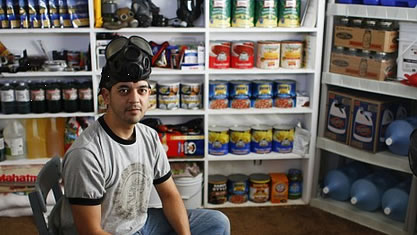Embracing Liberty: Overcoming Food Shortages with Libertarian Tactics
In times of crisis and food shortages, it is natural to rely on government assistance and policies to ensure our basic needs are met. However, libertarians propose a different approach – one that emphasizes personal liberty, self-reliance, and voluntary cooperation. While this may seem unconventional, embracing libertarian tactics can empower individuals and communities to not only survive but flourish amidst food scarcity. Let’s explore how these principles can be applied to overcome the challenges of food shortages.
Flourishing Amidst Chaos: Empowering Self-Reliance in Food Scarcity
- Community Gardens and Local Agriculture: One of the fundamental libertarian tactics to combat food shortages is to encourage the establishment of community gardens and support local agriculture. By cultivating small plots of land together, individuals can grow their own vegetables and fruits, providing a sustainable source of fresh produce. Furthermore, this approach fosters a sense of community and encourages voluntary cooperation, as neighbors come together to share resources, knowledge, and labor. The collective effort not only ensures food security but also creates a vibrant and resilient community capable of weathering any storm.
- Barter and Voluntary Exchanges: Another effective libertarian tactic during food shortages is to promote barter and voluntary exchanges. Instead of relying solely on limited government resources, individuals can engage in mutually beneficial trades, exchanging surplus goods or services for food items. This creates a self-reliant system where individuals can contribute their unique skills and assets to obtain the necessary sustenance. Whether it is trading homemade bread for fresh eggs or offering gardening services in exchange for vegetables, voluntary exchanges foster a sense of entrepreneurship, resourcefulness, and interconnectedness within the community.
- Education and Skill-Sharing: The libertarian approach to food shortages also emphasizes the importance of education and skill-sharing. Encouraging individuals to learn practical skills such as gardening, food preservation, and cooking not only empowers them to produce their own food but also equips them with valuable knowledge that can be shared with others. By organizing workshops, seminars, and community events, individuals can come together to teach and learn from each other, building a network of resilient and self-reliant individuals who are better prepared to navigate future food challenges.
By embracing libertarian tactics, individuals and communities can transform moments of crisis and food shortages into opportunities for personal growth, self-reliance, and prosperity. Through the establishment of community gardens, fostering barter and voluntary exchanges, and promoting education and skill-sharing, individuals can assert their liberty and empower themselves to not only survive but thrive in the face of food scarcity. So, let us join hands and embrace the principles of liberty, for in doing so, we can create a world where food shortages no longer instill fear but rather serve as a catalyst for the flourishing of human potential.

